

Critical information literacy. (Day 74/100) – Quick Ask Zoe. At the CU Libraries Instruction Unconference, I attended a session about practical critical information literacy.

The facilitator suggested that we introduce ourselves by explaining how we first learned about critical information literacy. Several participants indicated that the session itself was their introduction to critical information literacy, while others commented that they learned about the topic through graduate school, research about pedagogy, Twitter, and blogs. » Blacklists are technically infeasible, practically unreliable and unethical. Period. It’s been a big weekend for poorly designed blacklists.
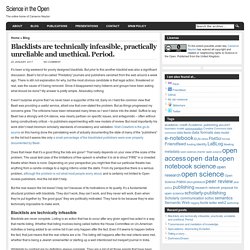
But prior to this another blacklist was also a significant discussion. Beall’s list of so-called “Predatory” journals and publishers vanished from the web around a week ago. There is still not explanation for why, but the most obvious candidate is that legal action, threatened or real, was the cause of it being removed. Since it disappeared many listservs and groups have been asking what should be done? My answer is pretty simple. Cognitive bias cheat sheet – Better Humans. Great, how am I supposed to remember all of this?
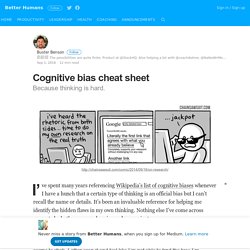
You don’t have to. But you can start by remembering these four giant problems our brains have evolved to deal with over the last few million years (and maybe bookmark this page if you want to occasionally reference it for the exact bias you’re looking for): All I Know Is What’s on the Internet — Real Life. All I Know Is What’s on the Internet Information literacy is not the antidote to fake news, because the institutions for teaching it can’t be trusted either Rolin Moe January 17, 2017 share Image: "Lost in Reflection" from Night Shift by Guillaume Lachapelle.
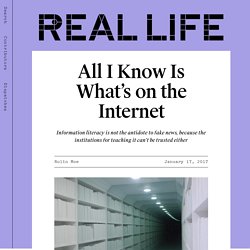
Fake news elected Donald Trump. At least, judging by media attention — social or otherwise — one might come to that conclusion. Though they may profit from a culture of obfuscation, fake-headline writers did not build it alone. Fake news is squatting in one building in an entire landscape of neglect and corruption; evicting them will make no difference to the blight Fake news is a convenient framing that sets the stage for feel-good, ultimately escapist solutions. Just as fake news is not new, neither is information literacy. That report was itself a response to a paper from the 1974 National Commission on Libraries and Information Science, which called for the nation to achieve information literacy by 1984.
Once a fearsome murderer invaded a Zen master’s home. The End of Theory: The Data Deluge Makes the Scientific Method Obsolete. But faced with massive data, this approach to science — hypothesize, model, test — is becoming obsolete.
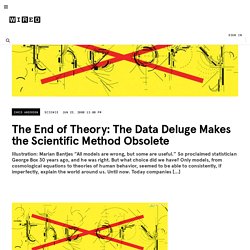
Consider physics: Newtonian models were crude approximations of the truth (wrong at the atomic level, but still useful). A hundred years ago, statistically based quantum mechanics offered a better picture — but quantum mechanics is yet another model, and as such it, too, is flawed, no doubt a caricature of a more complex underlying reality. The reason physics has drifted into theoretical speculation about n-dimensional grand unified models over the past few decades (the "beautiful story" phase of a discipline starved of data) is that we don't know how to run the experiments that would falsify the hypotheses — the energies are too high, the accelerators too expensive, and so on.
Now biology is heading in the same direction. In short, the more we learn about biology, the further we find ourselves from a model that can explain it. The Surprising Political Power Of Libraries. There’s a practicum student at the desk when I arrive for my shift.
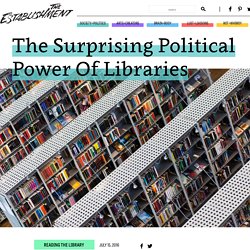
She’s here for a three-week work term before finishing her Master’s in Library Studies. We chat for a while between serving customers, and then she turns to me: “Did you know that our Health display is all diet books? All of them!” I’ve been working here for two months, but I didn’t know that. I walk over to the display, a permanent showcase of books vaguely categorized as “Health and Wellness.” The public library is considered a bipartisan environment, and many library systems have explicit policies to that effect. The American Library Association (ALA) defines core values of librarianship that include access, privacy, diversity, intellectual freedom, and serving the public good. Identifying reliable sources.
"WP:Reliable" redirects here.
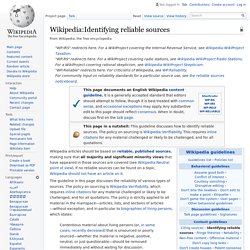
For criticisms of Wikipedia, see WP:Reliability. Wikipedia articles should be based on reliable, published sources, making sure that all majority and significant minority views that have appeared in those sources are covered (see Wikipedia:Neutral point of view). If no reliable sources can be found on a topic, Wikipedia should not have an article on it. The guideline in this page discusses the reliability of various types of sources. “The past is already gone, the future is not yet here. There’s only one moment for you to live.” – Fake Buddha Quotes. I’m quite sure this quote, which was sent to me the other day, is fake: “The past is already gone, the future is not yet here.
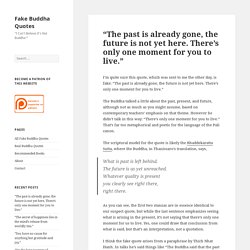
There’s only one moment for you to live.” The Buddha talked a little about the past, present, and future, although not as much as you might assume, based on contemporary teachers’ emphasis on that theme. LibGuides: Pedagogy to Oppress? - Hybrid Pedagogy. You have to be a pretty tenacious researcher to find any criticism about LibGuides, the practical and convenient tool that librarians use to create online guides to research.
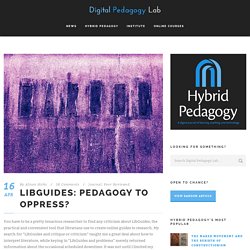
My search for “LibGuides and critique or criticism” taught me a great deal about how to interpret literature, while keying in “LibGuides and problems” merely returned information about the occasional scheduled downtime. It was not until I limited my search to wordpress.com and then traced a bunch of links and pingbacks that I could even start to gather a sense of the conversation round the topic.